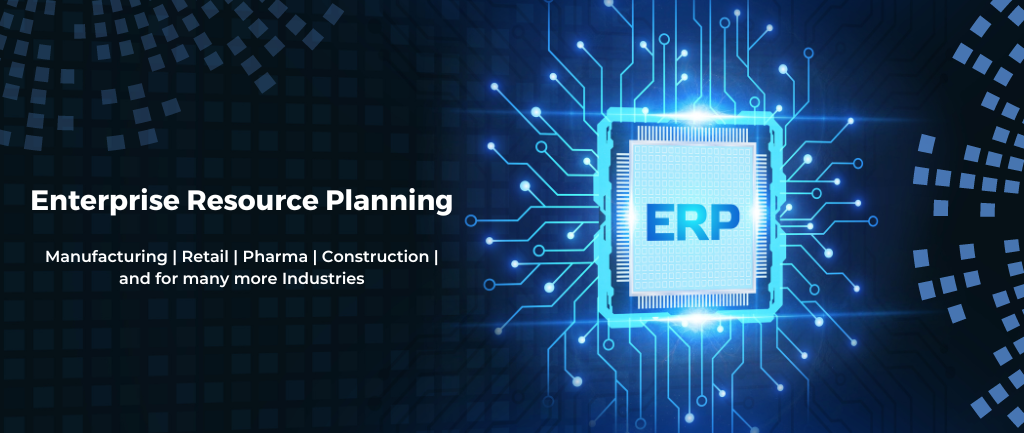
In today’s fast-paced business landscape, organizations across various industries are seeking efficient ways to streamline their operations, optimize resources, and drive growth. Enterprise Resource Planning (ERP) solutions have emerged as a game-changer, offering a comprehensive suite of integrated applications that enable seamless management of core business processes. In this blog, we will explore the application of ERP solutions in the manufacturing, retail, healthcare, and construction industries, backed by relevant data and examples.
ERP in Manufacturing: The manufacturing industry demands precision, coordination, and effective resource management. ERP solutions provide end-to-end visibility and control over production processes, supply chain management, inventory, and more. According to a study by Aberdeen Group, ERP implementation in manufacturing can lead to a 20% reduction in overall operational costs and a 15% improvement in on-time delivery performance.
Real-world example: A leading automobile manufacturer implemented an ERP solution that integrated its production planning, inventory management, and supplier relationship management. As a result, they witnessed a 30% reduction in inventory carrying costs and a 15% improvement in order fulfillment rates.
ERP in Retail: Retail organizations face unique challenges such as inventory management, demand forecasting, and customer relationship management. ERP solutions provide real-time insights into sales, inventory levels, and customer behavior, enabling retailers to make data-driven decisions and enhance customer experiences. According to Forrester Research, ERP implementation in retail can reduce operating costs by up to 15%.
Real-world example: A multinational retail chain integrated its ERP system with its point-of-sale terminals and e-commerce platforms. This enabled them to synchronize inventory levels, optimize pricing strategies, and offer personalized recommendations to customers. As a result, they experienced a 20% increase in sales revenue.
ERP in Healthcare: The healthcare industry requires efficient management of patient data, supply chain, and regulatory compliance. ERP solutions facilitate seamless integration between hospital management, billing systems, electronic health records, and other critical processes. Research by KLAS Enterprises indicates that ERP implementation in healthcare can lead to a 30% reduction in billing errors and a 20% increase in revenue cycle efficiency.
Real-world example: A large hospital implemented an ERP solution to streamline its operations, including patient registration, scheduling, and billing. The solution automated manual processes, resulting in a 40% decrease in patient waiting times and a 25% improvement in revenue collection.
ERP in Construction: The construction industry faces complexities related to project management, subcontractor coordination, and financial control. ERP solutions centralize project data, streamline collaboration, and provide real-time visibility into project progress and costs. A report by Dodge Data & Analytics highlights that companies using ERP in construction experience a 23% reduction in project duration and a 20% improvement in on-time project delivery.
Real-world example: A construction company implemented an ERP solution that integrated project planning, resource allocation, and financial management. As a result, they achieved a 15% reduction in project costs and a 30% improvement in project completion time.
The transformative power of ERP solutions has revolutionized various industries, including manufacturing, retail, healthcare, and construction. The statistics and examples presented above demonstrate the tangible benefits organizations can achieve by embracing ERP technology. By integrating and streamlining core business processes, ERP solutions enable organizations to maximize efficiency, reduce costs, and drive growth.
Enterprise Resource Planning (ERP) solutions have become increasingly crucial in the global industry landscape. With the advent of globalization, businesses operating on a global scale face numerous challenges, such as managing diverse operations, integrating data from multiple locations, and ensuring standardized practices across borders. ERP systems address these challenges by providing a centralized platform that connects various departments and functions, streamlining processes, and enabling seamless collaboration. By offering real-time visibility into global operations, ERP solutions empower organizations to make data-driven decisions, optimize resources, and enhance operational efficiency.
Moreover, ERP systems facilitate compliance with international regulations and standards, helping businesses navigate complex legal requirements and safeguard their reputation. With multilingual and multicurrency capabilities, ERP solutions cater to the diverse needs of global businesses, enabling seamless communication, transaction management, and localization efforts. By leveraging the power of ERP, organizations can overcome the complexities of the global industry, achieve operational excellence, and drive sustainable growth.
If you’re looking for a reliable ERP solution, consider Bizinso’s ERP development. With its comprehensive suite of features and industry-specific customization options, Bizinso offers a robust ERP solution that can empower your business to thrive in today’s competitive landscape.